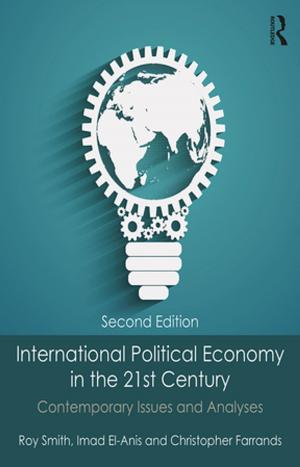Business Models for Renewable Energy in the Built Environment
Nonfiction, Science & Nature, Technology, Power Resources| Author: | Iea-Retd | ISBN: | 9781136183423 |
| Publisher: | Taylor and Francis | Publication: | March 5, 2013 |
| Imprint: | Routledge | Language: | English |
| Author: | Iea-Retd |
| ISBN: | 9781136183423 |
| Publisher: | Taylor and Francis |
| Publication: | March 5, 2013 |
| Imprint: | Routledge |
| Language: | English |
Business Models for Renewable Energy in the Built Environment provides insight to policy makers and market actors as to the ways that new and innovative business models (and/or policy measures) can stimulate the deployment of renewable energy technologies (RET) and energy efficiency (EE) measures in this field. This project was initiated and funded by the IEA Implementing Agreement for Renewable Energy Technology Deployment (IEA-RETD). It analyses ten business models in three categories, covering different types of energy service companies (ESCO’s).
Included
developing properties certified with a ‘green’ building label
building owners profiting from rent increases after EE measures
property Assessed Clean Energy (PACE) financing
on-bill financing
leasing of RET equipment.
Coverage extends to the organisational and financial structure of the models and the existing market and policy context, plus analysis of Strengths, Weaknesses, Opportunities and Threats (SWOT). The book concludes with recommendations for policy makers and other market actors on how to encourage and accelerate built environment renewable energy technologies.
Business Models for Renewable Energy in the Built Environment provides insight to policy makers and market actors as to the ways that new and innovative business models (and/or policy measures) can stimulate the deployment of renewable energy technologies (RET) and energy efficiency (EE) measures in this field. This project was initiated and funded by the IEA Implementing Agreement for Renewable Energy Technology Deployment (IEA-RETD). It analyses ten business models in three categories, covering different types of energy service companies (ESCO’s).
Included
developing properties certified with a ‘green’ building label
building owners profiting from rent increases after EE measures
property Assessed Clean Energy (PACE) financing
on-bill financing
leasing of RET equipment.
Coverage extends to the organisational and financial structure of the models and the existing market and policy context, plus analysis of Strengths, Weaknesses, Opportunities and Threats (SWOT). The book concludes with recommendations for policy makers and other market actors on how to encourage and accelerate built environment renewable energy technologies.















